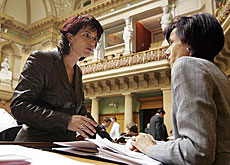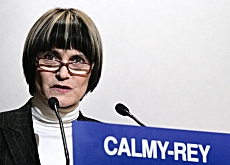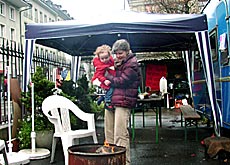Switzerland loses ground on women in politics

Switzerland has slipped five places in the world rankings of female representation in parliament, with only one politician in four a woman.
The country fell from 22nd to 27th place in the annual survey, compiled by the Geneva-based Inter-Parliamentary Union (IPU).
This year’s results showed that, despite an increasing proportion of women politicians, Switzerland is losing ground internationally.
Rwanda – where 49 per cent of politicians are women – tops the IPU list of women’s representation in 187 national parliaments. This is partly due to a legal quota system.
Scandinavian countries are next in line, with an average of 40 per cent. Sweden is placed second on the list, with 45 per cent.
The trend towards greater female political representation in developing countries has seen Switzerland drop down the rankings, although the numbers have not changed much in recent years.
While Switzerland managed to make 14th place in 1999 with 22.5 per cent of its national parliamentarians being women, the country has since been overtaken by Burundi, Afghanistan, Vietnam, Namibia and others.
Inequality
Yvette Barbier, Swiss campaigner for female representation in politics, told swissinfo that the situation in Switzerland was not good enough.
“Women make up just over 50 per cent of the population, therefore equality would mean they should be more represented at all levels of state,” she said.
“Even though women make the fields of health, education and social services work on an everyday level, they do not influence decisions enough at the policy-making level,” she added.
Barbier said many women were held back from taking part in politics because they carry an unequal share of the demands of family and home life.
“When they do [pursue a career in politics], they are often up against patriarchal political parties which do not put them in a position where they can be elected.”
Good neighbours
Some of Switzerland’s neighbours are performing better in terms of attracting women into politics.
More than a third of Austria’s parliamentarians are women, while Germany is in 16th place with 32 per cent.
France and Italy are not such shining examples of female participation, with women making up 12 and 11.5 per cent respectively of their national parliaments.
Overall, women are poorly represented in Arab countries, with an average participation of seven per cent. There were no female parliamentarians reported for Saudi Arabia, Bahrain and the United Arab Emirates.
According to the IPU, the worldwide average for female political representation in parliament at the end of 2005 was 16.2 per cent – 16.4 in the lower chamber and 15.2 in the upper chamber.
The data is compiled by the IPU on the basis of information provided by national parliaments by December 31, 2005.
Irritating element?
Speaking at an open forum alongside the World Economic Forum in Davos last week, Swiss Foreign Minister Micheline Calmy-Rey said women in positions of power often met subtle resistance.
“They are considered to be neither proper women nor real men,” she said.
The only Swiss woman cabinet minister said female decision makers were demonised.
“Women are perceived as an irritating element in the male-dominated order,” she told the audience.
swissinfo with agencies
Percentage of women in national parliaments:
Rwanda, 1st place, 49 %
Sweden, 2nd, 45 %
Norway, 3rd, 38 %
Austria, 12th, 34 %
Germany, 16th, 32 %
Switzerland, 27th, 25 %
Britain, 50th, 20 %
USA, 67th, 15 %
France, 82nd, 12 %
Italy, 86th, 11.5 %
World average: 16 %
The Geneva-based Inter-Parliamentary Union, established in 1889, is the international organisation of parliaments of sovereign states.
The Union is the focal point for worldwide parliamentary dialogue and works for peace and co-operation among peoples and for the firm establishment of representative democracy.
Data on female representation in parliament is compiled and published annually by the IPU, based on end-of-year information supplied by parliaments.

In compliance with the JTI standards
More: SWI swissinfo.ch certified by the Journalism Trust Initiative


You can find an overview of ongoing debates with our journalists here. Please join us!
If you want to start a conversation about a topic raised in this article or want to report factual errors, email us at english@swissinfo.ch.